Republican Campaigns Meet In Effort To “Fix” Debates, But They Won’t Do What’s Necessary
Representatives from most of the Republican Presidential campaigns met to discuss reforms to the debate process, but none of their ideas will actually improve the quality of debates.
In the wake of a debate last Wednesday that received almost universally bad reviews not because of the content but because of the fact that the moderators used by CNBC basically lost control of the process and ended up asking questions that bordered on the irrelevant and silly, representatives from nearly all of the Republican Presidential campaigns met late yesterday in an effort to take control of what they claim has become an out of control process:
ALEXANDRIA, Va. — The presidential candidates in the crowded Republican field finally can agree on at least one thing: just how frustrated they are with the debate process so far.
In a meeting here Sunday evening following the fallout from last week’s CNBC debate — in which the campaigns blamed both the Republican National Committee and the television networkfor what they said was an unfair debate — representatives of most of the campaigns met to discuss how to exert more influence over the process.
They emerged with a modest list of demands, including opening and closing statements of at least 30 seconds; “parity and integrity” on questions, meaning that all candidates would receive similarly substantive questions; no so-called lightning rounds; and approval of any graphics that are aired during the debate.
The campaign representatives also moved to take the Republican National Committee out of the debate negotiating process, calling for the campaigns to negotiate directly with the TV networks over format, and to receive information about the rules and criteria at least 30 days before each debate.
Ben Ginsberg, a top Republican lawyer and debate negotiator who was invited to serve as a facilitator at the meeting, is drafting a letter — without the R.N.C.’s input — that the campaigns plan to send to the networks within 48 hours. Mr. Ginsberg called the committee immediately after the meeting to convey the group’s next steps.
In an attempt at damage control on Friday, the R.N.C. suspended a Feb. 26 debate scheduled to be hosted by NBC News and the NBC-owned, Spanish-language network Telemundo. And on Sunday, shortly before the meeting, the committee shook up its debate staff by assigning Sean Cairncross, its chief operating officer and former chief counsel, to take the lead in negotiating with the networks.
While the Republican committee will still handle debate logistics, there was a robust discussion in the meeting — but no official decision — over just how much the campaigns hoped to minimize the R.N.C.’s role.
“What we have seen is a significant lack of information from the networks, so the goal is, let’s give the campaigns as much information as possible, so they can be prepared for the debates,” said Corey Lewandowski, the campaign manager for Donald J. Trump.
Sean Spicer, the R.N.C.’s communications director, said: “There’s no question that last week’s debate was a disaster. Our candidates deserve the best format and the best stage to articulate their vision.”
The campaigns remained divided on a host of issues. At one point, Jeb Bush’s team pushed to reinstate Telemundo for the Feb. 26 debate. The party has struggled with Hispanic outreach, and Mr. Bush, the former Florida governor, who speaks fluent Spanish and whose wife is from Mexico, hopes to win over Hispanic voters. But aides to Mr. Trump disagreed, threatening to boycott.
The campaigns of Senator Lindsey Graham of South Carolina and Gov. Bobby Jindal of Louisiana are simply eager to have their candidates move from the “undercard” stage to the prime-time debate. They have suggested holding two prime-time debates in one evening, each roughly 90 minutes. The candidates — seven for each debate — would be chosen randomly instead of by their positions in the polls.
The Washington Post‘s Robert Costa and Dave Weigel have more details:
Several Republican presidential campaigns began mapping out new demands Sunday for greater control over the format and content of primary debates, which have attracted big audiences and become strategically critical for the 2016 cycle’s expansive field of contenders.
The effort was a response to long-simmering frustrations over the debates, the questions and in some cases the moderators, which boiled over this weekend when advisers from at least 11 campaigns met in the Washington suburbs to deliberate about how to regain sway over the process.
The private gathering became the latest twist in what has been a turbulent season of debates for the GOP, with less-popular candidates — including a sitting senator and governor — furious about being relegated to a little-watched “undercard” debate and the front-runners dismayed by a system they have described as a disastrous brew of bias and arbitrary rules.
The meeting also exposed a leadership rift that has widened in recent days between the Republican National Committee, which negotiated the debate schedule and formats, and some of the candidates. RNC officials said they would not participate in Sunday’s meeting, but they have been reassuring campaign operatives that they are willing to recalibrate the events.
Shortly before the meeting began, RNC Chairman Reince Priebus announced a staff shake-up within the GOP that appeared intended to calm the unhappiness of the presidential campaigns.
(…)
As the meeting got underway, senior strategists from several presidential campaigns revealed in e-mails and text messages that Priebus’s staff shake-up was not enough. One campaign manager, speaking about the private meeting on the condition of anonymity, wrote: “Major question is if the RNC should be involved at all.”
The campaigns reached an early consensus on one issue, according to several operatives in the room: the secure standing of Fox News Channel. Any changes would be applied to debates after next week’s Fox Business Network debate. Among the reasons, according to one operative in the room, was that “people are afraid to make Roger [Ailes] mad,” a reference to the network’s chief.
Bush campaign manager Danny Diaz recommended that Telemundo be reinstated after being dropped along with NBC. But the campaign of businessman Donald Trump, represented by manager Corey Lewandowski, threatened to boycott a debate if the Spanish-language network that Trump has clashed with was granted one.
Representatives from the undercard campaigns of Sen. Lindsey O. Graham (S.C.), former senator Rick Santorum (Pa.) and Louisiana Gov. Bobby Jindal told reporters that they would focus on what Graham adviser Brett O’Donnell called “equal treatment” for their campaigns — two debates, each with seven randomly selected candidates.
Ben Carson’s campaign manager, Barry Bennett, was hopeful that the group could agree on one two-hour debate with every candidate onstage.
“Of course, we’re not going to get five-minute opening statements,” Bennett said, but “you can do a lot in two hours.”
Some tension was already in the air about that idea. Several campaigns, including Trump’s, were more interested in reducing the number of candidates on the stage.
“One of the big goals is allowing for more substance and equal time,” said Sarah Huckabee Sanders, the campaign manager for her father, former Arkansas governor Mike Huckabee. “It does make that difficult if there are multiple candidates but the debate’s capped at two hours.”
Carson advisers have also proposed airing the debates on the Internet rather than on television.
As they left the hotel, Republican aides said reporters should expect the campaigns to release a joint letter addressed to the television networks by Tuesday. It will list what the campaigns want for the upcoming debates and was agreed to before the meeting ended. Campaigns will have Monday to review it a final time and formally sign off.
It’s hard to say exactly what will come of this meeting until something formal is released later today or tomorrow, but based on this reporting, and some more detailed information about what the campaigns have agreed upon in principle that Byron York writes about in his Washington Examiner column, the changes seem to be rather modest and unlikely to have any real impact on the debates going forward.
For example, the campaigns are saying that the Republican National Committee should be responsible solely for the logistics of debates going forward, which I presume means things such as forum selection and dealing with site coordinators and such, and that the campaigns themselves will deal with the networks. While that doesn’t seem like a problem up front considering that it has apparently been a general practice that campaign representatives have been included in RNC conference calls with network representatives for all of the previous debates, it’s kind of hard to see how fourteen separate campaigns, each of them with competing interests, are going to be able to come to enough agreement among themselves to effectively negotiate as a group. If it were a smaller group, it could perhaps work, but of course that’s not the case, and many of these campaigns are going to have very different interest. The representatives for the candidates who have been stuck in the undercard debates will want access to the main stage, while the representatives for frontrunners and those with a realistic chance of becoming frontrunners will want to limit the number of participants. Some candidates will want more time to answer questions, others less, and some will want direct questioning between the candidates while others will shy way from that. Coming up with a meaningful agreement based on all of that seems unlikely.
Most of the other points of agreement seem rather benign.
Opening and closing statements of at least 30 seconds doesn’t seem like anything networks would object to, or really anything that will add to the substance of a debate. The idea of “an equal number of questions” is, I suppose, laudable, but I’m not sure how a debate moderator working within a two hour time limit that includes commercials is supposed to ensure that, or if if it even makes sense. Does it really make sense, for example, that Rand Paul and John Kasich, who are currently near the bottom of the cut-off for the next debate on Fox Business Channel, should get as much air time as the people at the top of the polls? Does it make any sense at all that people who are getting less than 1% in the polls should get that kind of attention? And what if the debate occurs at a point when one candidate on the stage happens to be the focus of media attention because of something they’ve said or something about their record that recently became public, shouldn’t they get more attention because of that simply because they have become more newsworthy? Trying to limit the debate by forcing moderators to be “equal” just seems designed to make the entire process even more irrelevant than it frankly already is.
The final point of agreement is perhaps the most benign of all. The campaigns are asking for a more direct flow of information before debates from the network(s) and sponsoring organization(s) to the campaigns. This seems fair and rather easy to accomplish. I can understand why campaigns would want it and it doesn’t seem like something that networks or sponsors would have a problem with. At the same time, though, it’s hard to see how it’s going to improve the quality of debates going forward.
One thing about the reports coming out of last night’s meeting is telling, and it’s contained in the highlighted text from the Washington Post report. Specifically, the fact that the candidates all agreed, apparently without either much discussion, debate, or disagreement, that Fox News Channel and its affiliates would apparently not be subjected to the same scrutiny as the other networks. Based on the current Republican debate schedule, there are three future debates that will be broadcast on either Fox News Channel or Fox Business Channel out of the eight remaining on the official schedule. The fact that the campaigns are apparently afraid to criticize that network says a lot about the state of the Republican Party and its relationship with Fox News, and none of it good.
It will be easier to judge when the formal proposals come out in the next day or so, but on the surface it doesn’t seem as though these reforms will do much of anything to improve the quality of the debates themselves. Better moderators than the largely ineffectual crowd that handled the CNBC debate would certainly be a good idea, but as I said last week, in the end the only thing that will improve the quality of the debates in the sense of making them more informative and useful for potential voters would be restrict participation to candidates that actually have a realistic chance of winning their party’s nomination and, frankly, getting rid of undercard debates that few people are watching and include candidates that are largely irrelevant at this point. Of course, very few of the candidates are going to agree to something like that even now.
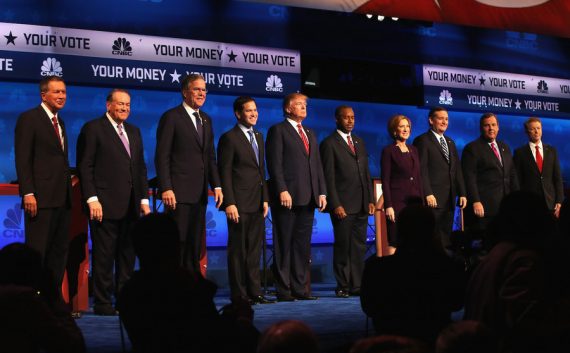

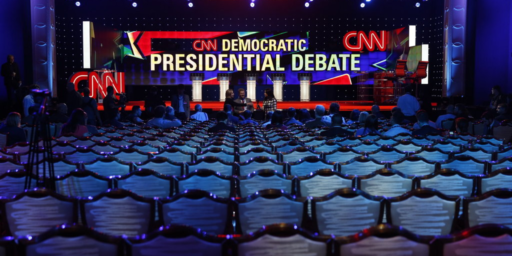
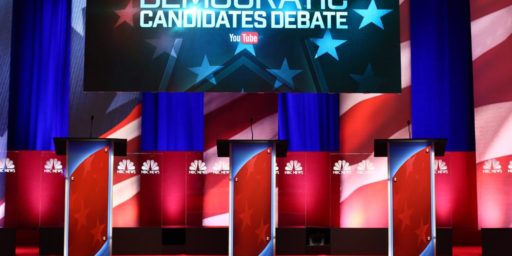
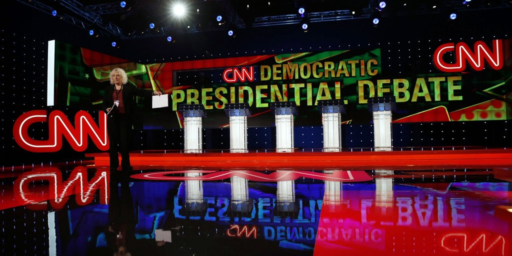
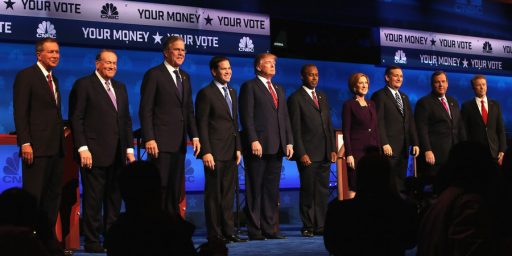
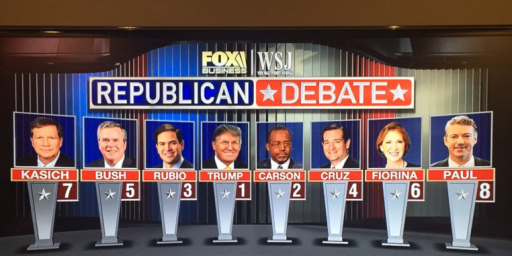
Again…the moderators weren’t great…but they did have the goods on each one of these clowns, if not the back-up.
The only way to improve these is if the participants decide to be truthful.
Carson did have a contract with that company.
Trump did malign Zunckenberg.
Rubio’s economic numbers do not work. (none of the candidates numbers work…that’s why they think they are gottcha questions.)
Fiorina was wrong about women and job losses under Obama.
Different moderators won’t fix any of that. And ignoring the mendacity in your post won’t either. Only different candidates, ones who aren’t so blithely un-tethered from the real world.
I think these candidates are, at the same time, unqualified for the office and perfect Republicans in that they refuse to be held accountable for either their words or actions.
We have seen whining about unfairness for pointing out their failings before…from GOP boy-wonder, Paul Ryan and from Rubio himself…just point out how their policies hurt anyone who isn’t rich and white and male. The GOP clown car doesn’t like answering questions about their unrealistic and idiotic policies…so they make being questioned about the policies the issue.
Amazing how Doug falls for it, hook line and sinker.
Yes, unless you are just using the debate to cement front-runner status.
@C. Clavin:
FOX moderators might well fix this, from the point of view of the candidates. Face it, they want balloon ball questions, and they want advance notice of the balloon balls. Maybe even veto over even the balloon balls. How else can they look good?
Of course that might leave them ill prepared for an honest debate with Clinton. But that’s likely to be the case anyway. (Can we start just calling her “Clinton”, and say “Bill Clinton” when we mean him?)
What would also help the debates is candidates who take positions that are not cartoonishly evil, so probing questions are viewed as probing questions, rather than vicious Liberal Media attempts to paint the Republicans as cartoonishly evil.
Doug–what you’re getting is the field of candidates squawking because they don’t get as much free PR as they want, where all questions that are lobbed at them are softball questions, and no one asks them anything embarrassing or calls them out on their lies and faulty math.
@gVOR08:
I’ve been refering to her as Clinton for some time.
I’ve got a list of vetted GOP debate questions right here:
(1) Is Obama the worst president of all time?
(2) Can you how Republicans will make America great again?
(3) Can you explain how Obama’s economic policies crashed the economy in 2008?
(4) Is it good for America that Obama uses Saul Alinsky’s tactics?
(5) Why did Obama urge citizens to hate their police departments?
(6) What is your favorite color?
@al-Ameda: They’d only get 1, 4, and 6. And I’m not sure about 6. The rest are still essay questions, not T/F or multiple choice. Essay questions are hard.
@al-Ameda:
What is the air-speed velocity of an unladen swallow?
@al-Ameda:
I can give you Trump’s answers:
1.”I will be the best jobs president God ever created.”
2.”I will hire really good people.”
3. “He didn’t go to the Wharton School, where I was a top student.”
4. “Nobody knows tactics like Donald Trump knows tactics.”
5. “I have an incredible relationship with the police.”
6. “The women have told me they love the color of my hair.”
One idea would be to take at some phone calls, texts, or written questions from the people, instead of preplanned, scripted, controlled formats from the networks.
@Mikey: Is that an African or European swallow?
@Tyrell:
Why? They would still lie their asses off just like they have in the last three debates.
@Tyrell:
They kind of did that with some of the past debates, with audience members submitting youtube videos beforehand. It’s a good way of mixing up the format, but I’m sure the debate hosts simply find someone stating a question they wanted to ask anyway, so I’m not sure if it brings in tougher questions.
Personally, I found the youtube and social media questions a bit annoying, but to each his/her own.
@Tyrell:
Have you heard their complaints? What makes you think that the candidates would be willing to answer questions that aren’t preplanned, scripted, and controlled?
@Gustopher: I think this is what got the GOP and the networks in the problem that they are in. As I have looked at the rules for the selection process, what I’ve seen was a system that was structured to be resistant to upwardly mobile candidates. They were trying to get rid of last election’s “flavor of the week” thing by biasing the debates to favor “the natural winners.”
What they didn’t expect was that the winners in question would be three yahoos with no political background. They also didn’t expect JEB! to be so spectacularly bad–in the NASCAR crash sense.
@Just ‘nutha ig’rant cracker: The RNC wanted to “fix” the debates, but more in the doping the horse sense of a “horse race.”
@PJ: That is true. Likewise, there would be questions that would not be allowed.
@Tyrell:
The questions submitted by ‘the people’ would very likely be screened, and end up very similar to the list of questions I worked up for this thread. Something like …
“Why does President Obama purposely divide us?”
“We can balance the budget by cutting off funding for Planned Parenthood and NPR, why haven’t we done that?”
… stuff like that